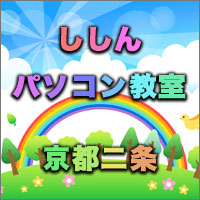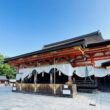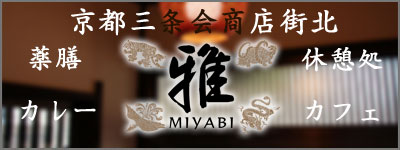The Kyoto-born band that reshaped Japan’s music scene
Posted date:2025-06-23Author:つばくろ(Tsubakuro) Transrator:ポンタ(Ponta)
Category:Talk about Kyoto
広告
adsense4
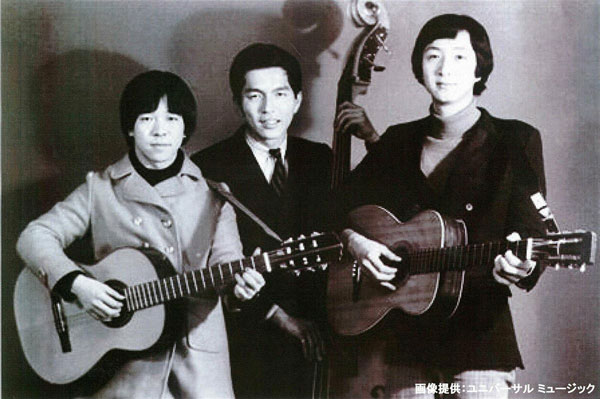
Photo of Folk Crusaders members

Photo of Imjin River
To begin with
Folk Crusaders, a band from Kyoto that changed the Japanese music scene, and the legendary song “Imjin River.”
I, the columnist was born and raised near Kyoto Imperial Palace, and when I went to visit the Palace as a child, I often saw groups of older men playing instruments and singing on the lawns here and there.
It was a story over 50 years ago.
The little columnist had no idea what the song was about, but their appearance was still eye-catching.
They had long hairs, wore red, yellow, green and other colorful clothes, and sang while playing their own instruments.
Furthermore, the atmosphere of the song felt somehow new.
They were a special kind of people that I would never meet once I stepped outside the Kyoto Imperial Palace.
As a young child, the columnist never tired of watching the older men out of curiosity.
Sometime later, I went to my older cousin’s house to visit, and she played a record for me, saying, “Let you hear an interesting song”, which was a record called “the returning drunker”.
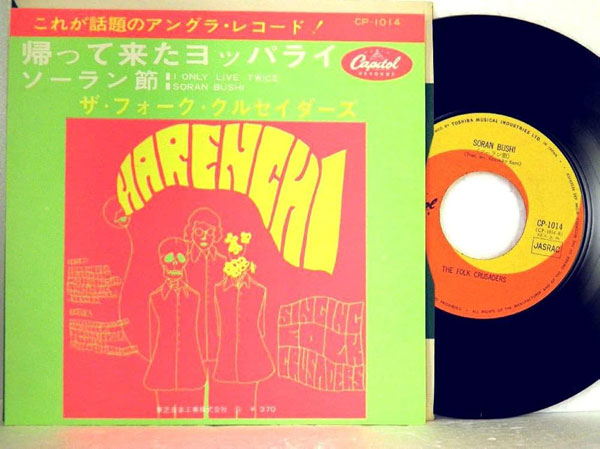
Photos of the record jacket and the face of the vinyl record of “Harenchi.”
I’m dead.
I’m dead.
This song, with its outlandish lyrics beginning with the words, and sung in a comical voice on a rapid-fire tape, had such a strong impact that once heard, it was unforgettable.
My niece explained that it was a big hit right now, and the people who sing this were university students from Doshisha or Prefectural Medical University.
“Their group is called the ‘Folk Crusaders’.
As I recall, it was the following fall that the columnist received an admission ticket to the university festival from a young man who I knew as a neighbor and was a student at Doshisha University.
Accompanied by my mother, I went to the campus of Doshisha University, where a Folk concert was being held.
Seeing the singers dressed as they appeared on stage one after the other, for the first time the I, columnist understood the identity of the group I had often seen at the Kyoto Gosho.
Doshisha University is at the knee of Kyoto Gosho.
“I guess this is the kind of music that’s popular among college students.” – It was a small moment, but I think it was the moment when I somehow understood what a music boom was.

Photo of the scene at the University Festival
Around the same time, the same niece played me a new record by the Folk Crusaders, the band that sang “The returned drunker.” It was a song titled “Sad and Unfulfilled.”
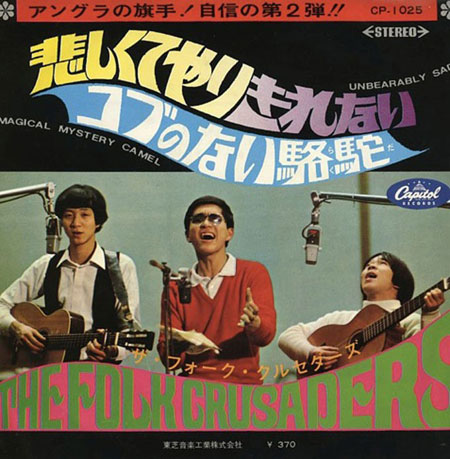
Photo of record jacket for “Sad and Unfulfilled.”
The beautiful melody line, which was so different from the previous “The returned drunker”, was deeply moving even to a child’s heart.
“It’s such a pity. It’s too bad that such a popular group had to break up.” At that time, my niece sighed.
When I asked, “Have these people quitted working together yet?”, then my niece replied, “Yes, they have already broken up.”
After all, the columnist had never seen the Folk Crusaders in active service, not even once. – not even on a TV screen.
Eventually, time passed, and it was when the columnist became a college student.
At the Osaka University of Foreign Studies, where the columnist enrolled, it was customary for each language department to put on a language drama performance at the annual university festival.
One year at a college festival, the columnist was watching a play performed by a friend from the Korean language department.
Then, at the curtain call, all the students of the Korean language department said this in their stage greeting.
“We, the students of the Korean language department, want to sing ‘Imjin River’ in the hope for the unification of North and South Korea,” they said. But this is not possible due to the international situation. The division between North and South, including Japan, has not changed since that ‘Folk Crusaders’ recorded ‘Imjin River’ but were forced to cancel its release for political reasons.”
It was then that the columnist heard the name “Folk Crusaders” for the first time in a long time and learned that they had a song called “Imjin River” that was apparently unreleased.
Now, this is a bit of a personal history, but it should give you some idea of what the “Folk Crusaders” are all about.
In other words, the “Folk Crusaders” are
1: The band formed by university students in Kyoto
2: Debuting with a sensational hit song
3: The release of a second song with a markedly different image and its immediate dissolution
4: Leaving the song “Imjin River,” which is said to be a cause of political controversy.
From now on, I would like to state on the number one student band that came out Kyoto, “Folk Crusaders.”
What is “Folk Crusaders”?
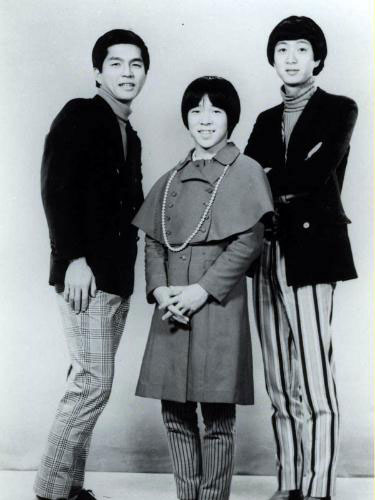
Photo of members of “Folk Crusaders”
The group was formed in 1965 by a group of young people who gathered in response to a posting by Kazuhiko Kato, then a student at Ryukoku University, in the reading column of the magazine “MEN’S CLUB” asking for members who would play folk music together.
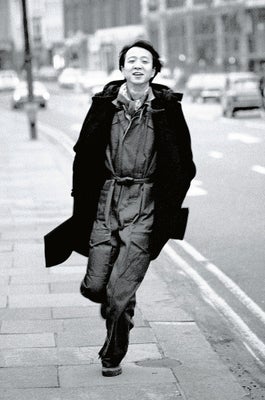
Photo of Kazuhiko Kato
Kazuhiko Kato was born in Kyoto and was raised in Tokyo. He started playing music under the influence of Bob Dylan and the Beatles. With his creative activities based on innovative ideas and seriously studied music theory, he led the Japanese music scene in the 1960s and 1970s. He later composed music for various genres, including kabuki and stage music, but committed suicide in 2008 due to worsening depression. It was his 62 years old. He was also known as a fashion leader ahead of the time.
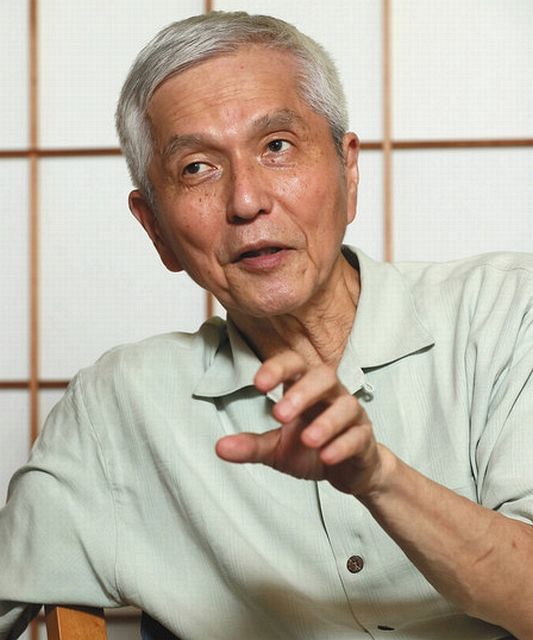
Photo of Osamu Kitayama
Osamu Kitayama was born and raised in Kyoto. Having come from a family of doctors for generations, he was a medical student at Kyoto Prefectural University of Medicine when the group was formed. He excelled at writing lyrics, and after the “Folk Crusaders” disbanded, he wrote lyrics for a number of hit songs while working as a psychiatrist. He is currently the President of Hakuho University.
In addition to the two founding members of the “Folk Crusaders”, there were two ronin students and one high school senior.
During the approximately three years as amateurs, the group was active in the Kansai underground, becoming four or three members as the ronin members sometimes had to concentrate on taking entrance exams.
Kazuhiko Kato also had no intention of becoming a professional in the beginning and wanted to become a cook in the future.
Osamu Kitayama, on the other hand, was studying to become a psychiatrist.
In 1967, one of the members was going on a trip to Europe, and the group decided to break up to make a break.
Osamu Kitayama suggested, “Let’s produce our own record to commemorate our breakup,” and they borrowed 230,000 yen from Kitayama’s father to release the self-produced album “Harenchi”.
Most of the songs on this album were copies, but there was one original song that was theirs.
It was “The returned drunker”, which would later become a big hit.
However, the 300 records pressed in total sold only less than 100 copies, and the rest were piled up at Kitayama’s house.
The members were so distressed that they took the records with them and ran around to radio stations they knew to advertise.
Then, a radio station in the Kansai region played the song “The returned durnker” from the album on a late-night broadcast, which ignited a firestorm and brought a flood of requests and inquiries.
Overnight, their group name became known throughout Japan.
Immediately, a number of record companies offered to sign contracts for the release of a single version of “The returned drunker”.
The reason why he signed a contract with Toshiba Music Industry for the single version of the song is because Toshiba was the label of The Beatles, whom Kazuhiko Kato respected like a God.
“The returned drunker”
This was the Folk Crusaders’ first big hit, selling a whopping 2.8 million copies.
A drunker die from drinking and driving and goes to heaven, but even though he is by God, he continues to drink in heaven and ends up being kicked out of heaven.
However, he steps down a flight of stairs and falls to the ground, only to be brought back to life safely.
It is a pioneering work of comic song with eccentric lyrics and a high-pitched voice that is created by the rapid rotation of tape, surprising the listener.
The person who wrote this lyric was a man named Takeshi Matuyama.
Takeshi Matuyama happened to be walking along Shijo-Kawaramachi when he met Kazuhiko Kato by chance, and they hit it off and began interacting with the members.
However, music cannot be done at all!
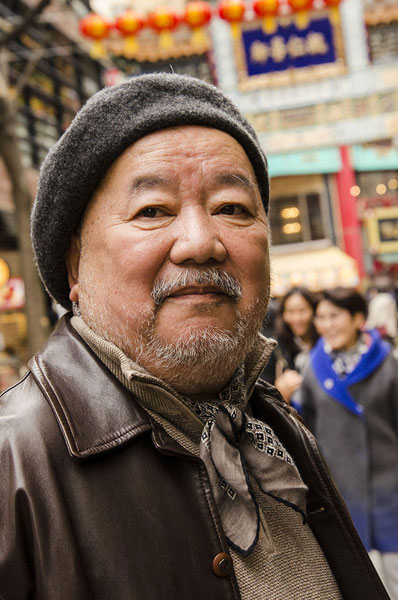
Photo of Takeshi Matuyama
Born and raised in Kyoto. Grew up near Koreatown. After constant flights between students at his own junior high school and those at the nearby Korean Intermediate School, Matuyama went to the Korean Intermediate School to sign up for a soccer match in an effort to deepen their relationship through soccer.
At that time, he happened to hear the song “Imjin River” and was fascinated by it.
Later a friend from the Korean Intermediate School whom he met on the banks of the Kamo River gave him the lyrics to “Imjin River” and a Korean dictionary, and Matuyama himself translated the lyrics into Japanese.
He later introduced the song to the members of “Folk Crusaders”.
Takeshi Matuyama is currently active as a lyricist and essayist.
What became of “Folk Crusaders”?
The record company begged them to make their professional debut after the huge success of “The returned drunker.”
However, Kazuhiko Kato, who was about to graduate and had already found a job as a cook, was not enthusiastic.
Kato reluctantly agreed to become a professional on the condition that they would disband after one year.
With the exception of Osamu Kitayama, the next two members were determined to take over the family business and left the band at this point.
The newest member to fill the void was Norihiko Hashida, a student at Doshisha University’s theology department.
The “Folk Crusaders” as they are known to the public refers to the three-member group after Norihiko Hashida joined the group.
Reunited at the end of 1967 for their professional debut, the Folk Crusaders disbanded with a farewell concert on October 17, 1968, as promised, leaving their second album “A.D. 2000” and a single song “Sad and Unfulfilled”.
They were active for just over seven months.
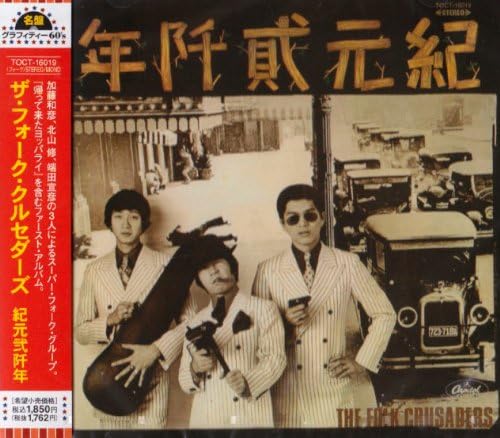
Photo of jacket for album “A.D. 2000”.

Photo of jacket for Sad and Unfulfilled.
After the breakup, Kazuhiko Kato turned into a professional solo singer. After releasing “That Wonderful Love Again” with lyrics by Osamu Kitayama and music by Kato, he went on to form the Sadistic Mika Band and again went solo, while also writing numerous songs as a composer.
Osamu Kitayama was active as lyricist while working as a psychiatrist.
Norihiko Hashida repeatedly formed and broke up groups such as “Norihiko Hashida and the Schuberts” and “Norihiko Hashida and the Climax” before turning solo.
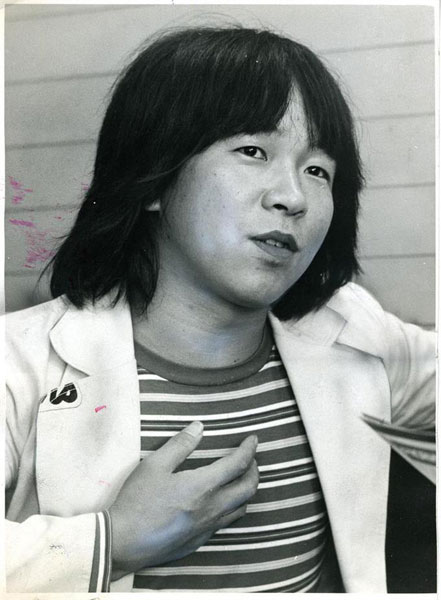
Photo of Norihiko Hashida
Episodes related to “Imjin River” and “Sad and Unfulfilled”
As mentioned earlier, “Imjin River” was given to “Folk Crusaders” through the hands of Takeshi.
The “Imjin River” is the name of a real river that straddles the 38th parallel, the border between the Republic of Korea and the Democratic People’s Republic of North Korea.
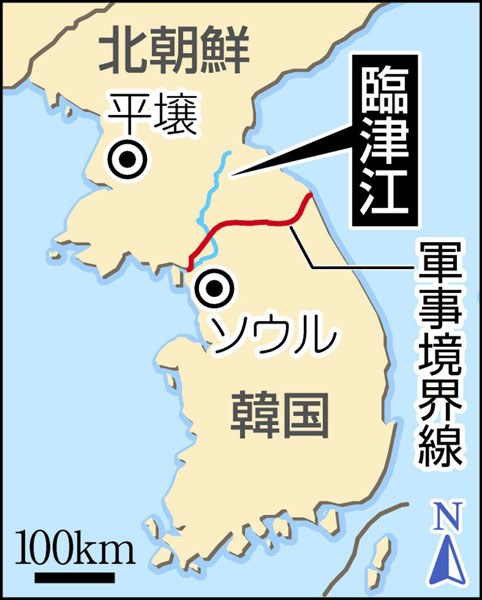
Photo of a map of the Imjin River flowing through
The lyrics is as followed.
Flow in a straight line
Waterfowl freely flock and fly about
My homeland, the land of the south
My thoughts are far away
Imjin River, clear water
Flow in a straight line
From the Land of the North
To the southern sky
Birds in flight, messengers of freedom
Who divided our country into two
Who has divided our country
Imjin River, far in the sky
Rainbow, please hang over me
River, convey my thoughts
I will never forget my hometown
Imjin River, clear water
Flow in a straight line
Because of its beautiful melody and melancholy lyrics, Takeshi Matuyama at first thought it was a folk song of unknown authorship.
The original poem given to him by a friend from the Korean Intermediate School contained only the first verse, so Takeshi Matuyama created his own lyrics for the second and third verses.
From the lyrical content of the first verse, he finished the second and third verses with the purpose of singing about the sorrow of the division of the two countries, the North and the South, and wishing for unification. Takeshi Matuyama then took over this song for “Folk Crusaders.”
The “Folk Crusaders” had sung this “Imjin River” many times at underground concerts since their amateur days.
And this “imjin River” was also included in their first album “Harenchi”.
The lyrics and melody are both so beautiful that the producer at Toshiba Music Industry had a hunch after hearing the song once that “This will definitely sell!”
The group then produced “Imjin River” as its second single and launched a major campaign.
However, the day before the release date, the record was suddenly cancelled.
This was due to a protest from the Federation of Korean Industries.
The reason was that this “Imjin River” was not a Korean folk song of unknown composer and lyricist as Takeshi Matuyama and the members had assumed.
This song was a propaganda song released in 1958, with music composed by Park Seyoung, who also composed North Korea’s national anthem, and lyrics by Ko Jong-Han.
Besides, the second lyric, which Takeshi Matuyama thought did not exist, actually did exist.
The content of the second lyric was to show off the superiority of the North, saying that the South is a rough land with no corps, but the North is a fruitful land, and that this should be conveyed to the South along with the flow of the river.
Takeshi Matuyama, who was completely unaware of such a situation, had created lyrics that saddened the division between North and South, using an image of the first verse as an expansion of the second.
The protest was made by the Federation of North Korean Industries, which had not established diplomatic relations at that time, and fearing that the song could become a political issue if it was not dealt with properly, Toshiba Music Industry immediately refrained from releasing “Imjin River.”
After their second single was cancelled, the members of the Folk Crusaders were directly confined to the record company’s conference room, where they were instructed to immediately write a new song.
When they were at a loss for ideas, Kazuhiko Kato suddenly said, “Let’s reverse the tape of ‘Imjin River’.”
They were skeptical and tried it, and what flowed was a very beautiful melody.
Kazuhiko Kato picked up the notes and created a new song in less than three hours.
The famous poet Hachiro Sato wrote the lyrics to the song, which became the second single, “Sad and Unfulfilled.”
The significance of “Folk Crusaders” and what has become of “Imjin River”
Although the Folk Crusaders disbanded after only seven months of professional activity, they left an extremely significant mark on Japanese music history.
It is, first of all, that none of the members had the desire to become professionals from the very beginning of the formation.
This is one of the major points that should not be overlooked.
It is that they were facing music with an amateur attitude and with only one desire: to enjoy music.
They had the freedom to write songs without the distraction of “Will it sell or not?”
They could write lyrics that satirized society and create experimental sounds.
The first big hit, “The returned drunker”, was born from this freedom to create the music of their choice.
Their trial-and-error approach is similar to that of the Beatles in making albums after they stopped their concert tours.
And they were university students.
The Folk Crusaders’ period of activity coincided with a period of intense social upheaval worldwide due to the Vietnam War, the Cold War, and racial issues. This was also the case in Japan.
It was just at the time when a storm of student movements was raging in Japan over the Security Treaty issue and the reversion of Okinawa to Japanese sovereignty.
After the breakup of the Folk Crusaders, Japanese music, especially folk songs, began to take on the appearance of protest songs with a strong message.
Many of the singers were university students in Kyoto like the “Folk Crusaders”.
Now, the legendary song “Imjin River,” which has been kept in storage, has not been sung publicly for many years due to the conflict between North and South Korea and the political position of Japan.
It wasn’t until 2002 that the “Folk Crusaders’ Imjin River has finally been lifted the ban.
However, even so, when the song was inserted as a song in the 2005 movie “Patchigi!”, those in the movie industry who offered to have the song broadcast by TV stations to promote the movie were blatantly met with difficulty by the stations.
Although the international situation has changed somewhat from the hypersensitive international situation of 1970, the reality is that the political and social issues surrounding the “Imjin River” have not yet been resolved.
References
1: Talking now about that time, that song, Osamu Kitayama, from The Folk Crusaders to its 60th birthday, interviewed and written by Yoshifumi Maeda, published in 2007, Art Days Publishing Co.
2: The Eternal Folk Crusaders – Like a Young Kazuhiko Kato by Hideki Taie, published in 2015 by Yamaha Music Media
3: “Camel without a hump” by Osamu Kitayama, published in 2016 by Iwanami Gendai Bunko
4: “The Story of Imjin River” The Truth of the “Sealed Song” by Yoshihiro Kita, published in 2015 by Ike Shobo
5: The Boy M’s Imjin River by Takeshi Matuyama, published in 2002 by Kirakusha Co.
Author
つばくろ(Tsubakuro)
I was born and raised in Kyoto and am a native Kyotoite.
When I was young, I longed to visit Tokyo and Osaka, which are more bustling than Kyoto, but as I have gotten older, I have come to appreciate Kyoto a little more.
In this site, I will introduce you to some of the best places to explore Kyoto's food that you might otherwise miss at first glance.
